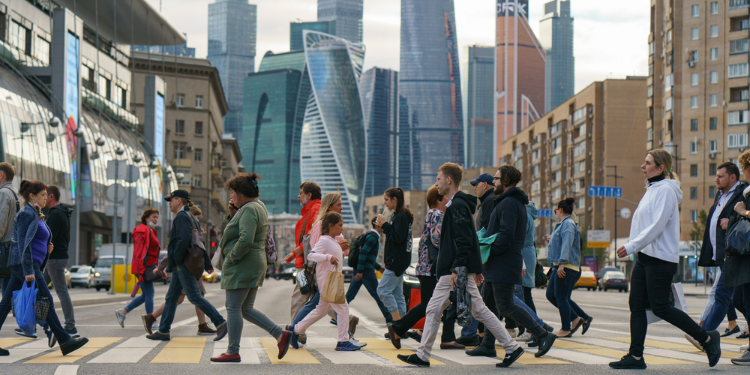
The Russian war in Ukraine has impacted drastically human rights, politics, economy, and more. In Russian lands, not everyone agrees with the current war situation, and many have suffered from sanctions consequences on trying to move abroad.
International sanctions have been imposed since March this year during the Russo-Ukrainian War by a large number of countries, including the United States, Canada, and the European Union, against Russia and Crimea following the Russian invasion of Ukraine, which began in late February 2014. Western countries have introduced increasingly widespread sanctions — targeting individuals, banks, businesses and major state-owned enterprises, and exports, among others.
Travel has become more difficult for Russians since the war broke out. While the elite are still able to jet off to Dubai and the Maldives, the most popular destinations for Russian travelers in Europe have been cut off by the ban on Russian planes using EU airspace. However, Serbia has become a popular “back door” to the West, and national carrier Air Serbia has increased flights between Belgrade and Moscow. Prices for the route have risen, but tickets are still being rapidly sold.
“Since the start of Russia's invasion of Ukraine, we have seen a substantial increase in traffic to and from Russia via Belgrade,” says Olivier Ponti, vice-president of insights at travel industry analysts ForwardKeys. However, the possibility of leaving isn't for all. Matvey, a Russian expat in Spain, comments Russians trying to leave the country won't be an easy task. “I think more people want to move abroad, of course, but it has become harder, so most of them will stay.”
How are Russian expats coping with international sanctions?
Matvey shares how the war consequences have been affecting him even from abroad. “Like anyone who gets money from Russia, it's pretty much impossible to get your money from a Russian bank account, pay at the supermarket or buy tickets. It's very hard to change Russian currency to euros directly, and it's impossible to use a card outside of Russia. It's just a piece of plastic now. I am still able to get money, but it's a lot of hassle”, he shares.
Although some Russians are thriving to leave the country while sanctions have been imposed, Matvey explains the war continues to impact them. “I think for some people who left Russia due to war, the ban on Russian credit cards was catastrophic. All your savings are in your bank account, you are somewhere in Europe or in Turkey, and you can't even pay for lunch or rent a flat. I don't know if it helps to stop the war, but it sure causes a lot of problems for people who live abroad, and the majority of them are against Putin and the current regime. So yes, this part had a huge impact on my life.”
Serbia, Germany and Uzbekistan have opened their doors
Debora Diniz, a Brazilian anthropologist who sought asylum in the US, commented on the “cancellation of Russians” abroad. “Repulsion for a political leader, Putin, can never be hatred for a people, its history, literature, or art. This is what fanaticism does: everyone and everything is an enemy. The name is xenophobia.”
In addition to increased flights between Belgrade and Moscow, Air Serbia began selling tickets on a new route between the capital and Sochi on Russia's Black Sea coast. “Sochi flights are designed for convenient connections with flights from Belgrade to Berlin, Vienna, Zurich, Dusseldorf, London, Ljubljana, Milan, Paris, Prague, Podgorica, Rome, Tivat, Venice and Zagreb,” said the group in a statement. Air Serbia did not respond to a request for comment.
Similarly, Germany has announced plans to relax visa requirements for skilled Russian workers who are considering emigrating following the invasion of Ukraine. At the same time, the Federal Office for the Protection of the Constitution, the country's domestic intelligence agency, warned that Russian workers in Germany were at risk of being recruited for industrial espionage.
In coordination with the federal government, the Federal Employment Agency has issued a so-called “global approval for access to the labor market” for Russian employees of German international companies, provided they are earning a salary of at least 43.992 euros per year.
This special status, which is provisionally in place until the end of September, automatically grants skilled Russian workers a long-term visa (rather than a 90-day Schengen visa), without them needing to obtain the approval of the Federal Employment Agency on a case-by-case basis.
Who is leaving Russia?
Besides, tour operator VEDI group is now selling packages to Uzbekistan to allow Russians to open accounts and obtain cards that work abroad. Several Russian agencies are now offering similar deals and receiving high demand due to the war crisis.
It is not only tourists that are making use of back doors. The charitable organization Kovcheg – ‘The Ark' – established by exiled dissident Mikhail Khodorkovsky, is facilitating the exit of refugees who oppose the war and Vladimir Putin's regime. The group estimates about 700,000 Russians have fled since the invasion.
Matvey confirms that Russians leaving are opposed to the war. “I don't know if it helps stop the war directly or indirectly, really, I am not an expert on that, but 99% of these people are against Putin and his gang. The ones who are responsible for it are in Russia and are not affected by some of these sanctions, in my opinion.” For him, the situation will change when Russia withdraws troops from Ukraine and stops bombing their cities. “Nobody knows when it will happen. I am not counting on it happening anytime soon but surely would love for it to happen as soon as possible.”
Kovcheg has established a support network operating in several central European states, including Armenia and Kazakhstan, helping refugees resettle and assist with visa applications, as well as providing temporary accommodation in Istanbul. The group has supported doctors, engineers, and IT workers, spokesperson Anastasiya Burakova told Lithuanian TV channel Delfi.



















